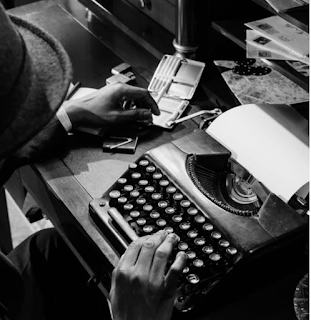
This essay was written for the extract question, focussing on the key scene where Birling first meets the Inspector. In my edition, this appears on pages 10-12. Please note that the extract I chose is longer than that which is usually set.
What’s important about this scene?
It shows some interesting aspects of the characters of Birling and Goole. The key themes are social status vs moral authority, justice vs denying responsibility.
If the extract is printed on the exam paper, do I need to quote?Yes! Please quote frequently. But make them short – about 1-5 words long – as in the example essay below. Underline these in your answer. It helps you to remember to quote – and it makes life easier for the examiner.
How does Priestly create a sense of drama in this extract?
Versions of this question frequently appear. You can do practice essays for this question on any extract of your choice.
What should I write about for this type of question?
How do Priestley’s techniques in this extract bring out the themes – and why is this an important scene at this moment in the play for the characters. Discuss structure, context, themes, characterisation, relationships and changes (i.e. character changes, or our understanding of that character changes).
What’s important about this scene?
It shows some interesting aspects of the characters of Birling and Goole. The key themes are social status vs moral authority, justice vs denying responsibility.
If the extract is printed on the exam paper, do I need to quote?Yes! Please quote frequently. But make them short – about 1-5 words long – as in the example essay below. Underline these in your answer. It helps you to remember to quote – and it makes life easier for the examiner.
How does Priestly create a sense of drama in this extract?
Versions of this question frequently appear. You can do practice essays for this question on any extract of your choice.
What should I write about for this type of question?
How do Priestley’s techniques in this extract bring out the themes – and why is this an important scene at this moment in the play for the characters. Discuss structure, context, themes, characterisation, relationships and changes (i.e. character changes, or our understanding of that character changes).
Useful Phrases For This Type of Question
–
builds up the theme of [say what theme]
–
–
–
is important [particularly significant/shocking] because
–
Essay:
How does Priestly create a sense of drama in this extract?
Before the Inspector arrives, the Birlings are celebrating a ‘special occasion’ and are self-satisfied, or ‘pleased with themselves’. The symbol of the Titanic looms large in an ominous way: Priestly is setting the scene for this ‘pink’ rose-tinted, luxurious happiness to be punctured, along with Birling’s status and respect, with the arrival of the Inspector.
Symbolically, Birling calls for ‘more light’, which starts a more business-like tone. Birling reassures himself of his authority and status as being ‘on the Bench’ assuming this will be ‘a Warrant.’ He immediately assumes the position of authority, which appears slightly silly in light of his previous bold pronouncements on the ‘Titanic’, the ‘Kaiser’ and the labour market. So when the Inspector arrives, we’re not quite as shocked as Birling to discover Birling is not all-knowing after all. The Inspector assumes control, which is a disturbing shift for Birling and he immediately tries to regain it. The Inspector cuts off Birling ‘cutting through, massively’. Whenever Priestly describes the Inspector, he uses the semantic field of size: showing the importance of this man, and his power.
The Inspector is immediately presented as authoritative, with stage directions like ‘weightily’, ‘massiveness, solidarity and purposefulness’. Priestly shows him as a ‘disconcerting’ force. He looks ‘hard’ at people, suggesting the theme of guilt, shining a light into the darkness and truth. This is most worrying for characters like Eric who is already on edge. Priestly has him exclaim ‘My God!’ (involuntarily) – which is interesting as it’s as if he’s lost control in this very controlled family environment where everyone takes care to behave properly – as where Birling welcomes the Inspector formally and offers him a drink. It’s significant and sinister that the Inspector refuses their hospitality ‘I’m on duty’. It suggests he’s impartial, can’t be bribed and isn’t here for friendly purposes; he isn’t afraid to be rude. He’s more interested in doing what’s right.
Birling starts to talk ‘impatiently’, in short, sharp fragments ‘Horrid business’ and repeats ‘yes’, as if he’s stuttering – angry or nervous. Later, his confidence and authority are further eroded. He seems to recognise ‘Eva Smith’ but speaks slowly with lots of dashes, and suggests it’s meaningless ‘doesn’t convey anything.’ He’s self-focussed, complaining, ‘I don’t see.’ He’s not interested in what happened to the girl, more in the fact that it’s not his problem and this links to the theme of the whole play. The reason Eva Smith died is becuase the Birlings acted without feeling personally responsible.
We see Birling’s authority break down further as his language becomes colloquial ‘y’know’ – or he’s trying to win over the Inspector. He says ‘Oh that’s it – is it?’ as if it’s really nothing. His language diminishes the scale of the problem and shifts blame, using the inclusive ‘we’ rather than ‘I’ – referring to the fact his factory has ‘hundreds of girls’ – as if he can’t be expected to be personally responsible for all of them.
We see Birling’s authority break down further as his language becomes colloquial ‘y’know’ – or he’s trying to win over the Inspector. He says ‘Oh that’s it – is it?’ as if it’s really nothing. His language diminishes the scale of the problem and shifts blame, using the inclusive ‘we’ rather than ‘I’ – referring to the fact his factory has ‘hundreds of girls’ – as if he can’t be expected to be personally responsible for all of them.
